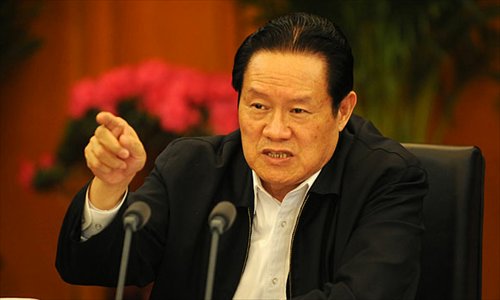Top-ranking ‘tiger’ probed
Disciplinary investigation into former security chief

Zhou Yongkang Photo: CFP
China on Tuesday announced an official investigation into former security chief Zhou Yongkang, the highest-ranking official that has been probed for corruption since the republic was founded in 1949.
The Central Committee of the Communist Party of China (CPC) decided to investigate Zhou for suspected "serious disciplinary violation," and the investigation will be conducted by the CPC Central Commission for Discipline Inspection, the Xinhua News Agency reported.
The decision was made in accordance with the CPC Constitution and the CPC discipline inspection authority's investigation regulation, said the statement.
Zhou, 71, was a member of the Standing Committee of the Political Bureau of the CPC Central Committee - the country's peak of power - from 2007 to 2012.
His probe marked a climax of the sweeping anti-graft campaign led by President Xi Jinping since November 2012 and fulfilled the authorities' promise that no matter how high an official's rank is, he will not escape punishment if proved guilty, said analysts.
Not addressed as comrade
Zhou's case is clearly a major breakthrough and the strongest demonstration of the leadership's anti-graft determination to clear the Party and improve its governance ability.
The statement did not reveal whether Zhou was suspected of breaching the law. However, it did not use the term "comrade" when referring to Zhou either, which suggests the severity of his case.
It is very likely that he will be expelled from the Party and transferred to judicial organs when the disciplinary investigation is completed, Wang Zhanyang, a professor with the Central Institute of Socialism, told the Global Times.
"Apparently, the leadership wants to make this case an impeccable example, especially in terms of procedure," said Wang.
An hour after Zhou's probe statement, the CPC announced that it will hold the Fourth Plenary Session of the 18th Central Committee in October to discuss key issues concerning the rule of law via the official news program Xinwen Lianbo on China Central Television at 7 pm Tuesday.
The key plenary session, viewed as a chance to reaffirm the policy direction of Xi's administration, has long been viewed as the final and best chance to announce Zhou's case after peripheral clues and signals have been spreading for over a year.
The two events are closely connected, especially judging by the subtle timing and sequence of the announcements. "Now that the rule of law has been publicly prioritized, Zhou's case will also establish a political standard inside top authorities, declaring that no one has the privilege to be an exception to the law," said Wang.
The early probe announcement provides the room for a Party decision to be made during the fourth plenary session, said Tong Zhiwei, a political science professor at the East China University of Political Science and Law.
Zhou served as the minister of public security from 2002 to 2007, and headed the central Political and Legal Affairs Committee from 2007 to 2012. For over 1o years, he had the superior power of domestic security and legal issues, and opened an era for "maintaining stability" when dealing with social conflicts.
Compared with fallen high-profile official Bo Xilai who was sentenced to life for bribe-taking, embezzlement and abuse of power in October 2013, the legal punishment for Zhou, if applicable, is unlikely to be lighter, said Wang.
The final conclusion of his problems apart from anti-graft remain unclear, said Zhang Xixian, a professor with the Party School of the CPC Central Committee.

Graphics: GT
Probe knows no limits
Rumors of him being probed started last year, but the authorities neither confirmed nor denied any speculation.
Zhou's power extended into three major realms: the petroleum industry, Southwest China's Sichuan Province and public security.
He served as general manager and Party chief of State oil giant China National Petroleum Corporation (CNPC) from 1996 to 1998 and worked there since 1988. He then became governor of Sichuan from 1999 to 2002 before being appointed public security minister.
Several senior officials and executives who have worked closely with Zhou in all three fields were toppled since December 2012, starting with Li Chuncheng, former deputy Party chief of Sichuan, who was also the first provincial-level official to go down in the campaign.
The sweep then stretched to the oil industry, as four senior CNPC managers were probed in August 2013, followed by Jiang Jiemin, former head of the State-owned Assets Supervision and Administration Commission of the State Council, who was Zhou's successor at CNPC.
In December 2013, Li Dongsheng, former vice-minister of public security, was probed.
The probes into these key protégés of Zhou triggered public speculation about his own situation. Furthermore, the authorities made rare acquiescence of a series of investigative reports published by some media, including caixin.com, about illegal deeds committed Zhou's family members, especially his son Zhou Bin, in January this year.
Lü Xinhua, spokesperson of the Chinese People's Political Consultative Conference, said at a press conference in March that the anti-graft campaign covers officials on all levels, followed by the revealing comment "you know what I mean."
Observers said that the central leadership showed great courage and composure in handling Zhou's investigation, starting from peripheral digging to nailing down the evidence.
The campaign will definitely be deepened with no limit in levels or numbers, especially in fields including energy, land, major construction and civil affairs, said a source close to the anti-graft campaign who requested anonymity.
"Zhou's case serves as a serious deterrent to those officials who are still 'observing' the situation," he said.
The current phase of digging out individual cases will help go below the tip of the iceberg and pinpoint problems during the process to build a better supervision and legal system, which will take time, said Zhang Xixian.
Jiang Jie contributed to this story